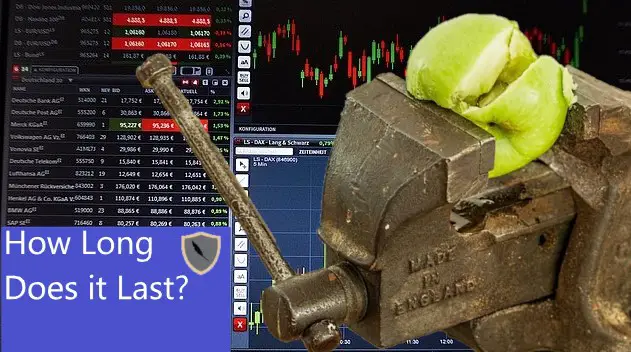Since the start of internet stock trading in the 1990’s short selling has come under attack. The collective consciousness that we call retail traders believe that short selling is unethical. This is because most people don’t fully understand how short selling impacts stocks nor how they profit from it.
Short selling is perfectly ethical. The reason is because of how the stock market works and how short selling works. When you short sell a position you actually go into debt to buy back the shares at a future date. This in no way impacts the underlying value of the stock itself, it only briefly moves it. The ethics of short selling are perfectly fine due to this reason. This article is going to explain why.
I break down this article into 5 sections. First, what are the two parts of short selling? Second, what are the ethics in the stock market? Third, does short selling “hurt” companies. Fourth, Is short selling ethical. Fifth, the only type of short sellers that are unethical.
Here at Chronohistoria I teach people how to generate above normal market returns in the markets. I routinely publish articles that go over investment research, methodologies, and tips/tricks of the trade so that you are better prepared to profit.
Feel free to sign up for the free newsletter to remain up to date on all things investing.
Let’s jump right into the article: The Ethics of Short Selling Explained.
What Are The Two Parts Of Short Selling
Short selling consists of two parts. Many people only know the first part and not the second. Because of this they believe that anybody who short sells actually hurts the companies investors and stock. This is absolutely not true.
The first part of short selling is to borrow shares and immediately sell them. Since you did not buy the shares in the first place you are “indebted” to buy them back to give back to the person who loaned them to you.
This creates a situation where there are a bunch of IOUs present in the marketplace. These can be recalled causing a massive spike in price on a stock/asset. This is called a short squeeze.
That is where 90% of investors stop in regards to their knowledge of short selling. The second part is where professional investors lie.
The second part of short selling is the benefits that short selling provides to investors in the stock market. First, short sellers provide liquidity. Second, short sellers prevent runaway stock prices and correct a price to an asset’s true value. Third, short sellers provide volatility which allows people to profit. (source)
Simply put, without short sellers constantly ‘correcting’ the price on a stock/asset then we would see a runaway effect. Short sellers provide an invaluable service to the markets. They correct stock prices to more accurately reflect their true value while also increasing liquidity and volatility.
(for a full rundown on short selling click here for an article over the methodology)
What Are The Ethics In The Stock Market
Anybody who engages with the stock market follows a set principle of rules and ethics. An investor will engage with these rules and ethics whether they know about them or not. This is because of the nature and goals of every stock market in the history of the world.
These are the ethics and goals of the stock market. Investors serve a valuable purpose to society by providing and transitioning capital from failing businesses to succeeding ones by buying and selling shares or stocks on a market. An investor/trader has an obligation to transition their capital in the most efficient way possible. If they are successful they will be rewarded with excess capital while bad investors are penalized with a loss. (source)
Investment managers, fund advisors, and brokers have more ethics. Ethics such as working for the best interest of their clients. However an individual investor’s ethical obligation is to help the market price stocks/assets in the most accurate way possible.
Thus we can see that short sellers actually provide a service that falls within the ethical confines of the stock markets. Next we need to discuss if short sellers actually hurt a company when they short sell.
Does Short Selling “Hurt” Companies
No, short selling does not hurt companies. This is because of two reasons.
First, a company’s stock price is completely different from the actual value of the company itself. Ask yourself this “If Google’s stock price dropped to $0 would the company be worthless?” The answer is of course no.
This is because the stock market’s whole purpose is to allow investors to speculate on the current and future value of companies by using data from the past. As such the stock market is completely different from both the company and the economy as a whole. If you’re interested I wrote up an entire article on the differences between a stock market and the economy. (You can read it by clicking here)
Since the stock’s price is completely different from the company’s value, anything that happens to the stock will not impact the company. Typically what happens is as a stock’s price falls investors pressure the company to lower overhead or increase profit. This in turn can hurt a company, but this is not caused by shorting. (source)
Second, short sellers benefit good companies. Since shorts have to take a loan out to rebuy shares in the future they increase volatility tremendously for a company. A good company can use this to their investors advantage and cause a massive spike in stock value.
A very famous company that did this recently was Tesla.
From 2019 to 2021 TSLA saw massive gains after short sellers underestimated the power of retail traders. What happened was that over a course of two years short sellers had to cover their losses and this pushed the price of TSLA through the roof.
In this case short sellers actually helped TSLA become the monster that it is today.
Is Short Selling Ethical
Hopefully you see that short selling is perfectly ethical. Those who engage in short selling take on a massive risk in the market by going out on loan to buy back shares. A short seller hopes that the price of a company will decrease so that when they buy back the shares they make a profit. (source)
Since short sellers provide a valuable service to the stock market along with taking on considerable risks they are perfectly fine. Most short sellers only short a company that is already failing, this causes the company’s stock price to start to correct back down to its expected level.
Further, short sellers prevent stocks from exploding on upwards volatility. All pumps need to be corrected at some point. If short selling was not a thing then people would normally have to sell, which an organized group of investors could manipulate to not sell. The market needs to incentivise people to profit from downtrends, thus short selling was invented.
Finally, short sellers don’t actually hurt the company. THey only correct the stock’s price. The reason this works is because the entire stock market runs off efficient market hypotheses. This means that the whole point of the stock market is to efficiently price stocks/assets. Short sellers help price a company’s stock accurately without hurting the actual company.
Simply put, short selling is perfectly fine. 99% of the time short sellers are just correcting the stock’s price. However there is one type of short seller that actually borders on the unethical category. They are called activist investors.
The Only Type of Short Sellers That Are Unethical
There is only one type of short seller that is borderline unethical. These are the activist short hedge funds/vulture funds.
An activist short selling fund is a hedge fund that first takes a position and then actively works to hurt the company’s stock price for it to fall artificially. An activist short fund will publish reports attacking companies’ products, invest in competitors’ brands, or sometimes engage in political coercion to plummet a company.
One of the best examples of these activist short funds is Elliot Management. Elliott management is one of the worlds largest activist hedge funds and in 2008 Elliot management successfully exposed corruption in the Republic of the Congo which caused their sovereign debt to skyrocket.
What separates a normal short seller from an activist short fund is that the fund will actively go out of its way to destroy the lives of people and companies just to make a profit. It is an extremely profitable way of investing and believe it or not it’s perfectly legal.
It really comes down to your personal stance on these vulture funds. Some people say that a vulture fund already preys on failing countries, industries, and people. Others say that it’s still wrong to kick people when they are down. I believe that in some capacity vulture funds engage in unethical short selling to make a profit.
However, aside from activist funds short selling is perfectly ethical.
Conclusion
There you have it; An entire article that goes over the ethics of short selling. Hopefully I can clear up some of the misconceptions that plagues the industry. Short selling is perfectly ethical and short sellers offer a valuable service to the stock market.
Here at Chronohistoria I teach people how to generate above normal market returns (alpha) within their portfolios. I rottenly publish articles on investment research, methodologies, and tips/tricks so that you are better armed to engage with today’s crazy markets.
Feel free to sign up for the free newsletter to remain up to date on all things investing.
Further, you can check out some of the other articles below.
-
How Long Does a Short Squeeze Last? (3 Answers)

What is the time frame for you short squeeze? Well here is everything you will ever need to know to determine how long it will last.
-
Why You Still Own a Stock After It’s Delisted and How to Sell It

Do you still own a stock after its delisted? How do you sell it? Don’t worry the stock is still worth money and here is how to sell.
-
Can You Make 1% A Day in the Stock Market? (3 Steps)

Making 1% a day in the stock market is hard but defiantly doable. Here are 3 simple steps to helping you achieve this return.
Until we meet again, I wish you the best of luck in your investing journey.
Sincerely,



